By: C.D. Michel
In a 2021 article for California NORML, I discussed how federal gun laws intersect with California’s legalization of recreational marijuana use. In that article, I examined Ninth Circuit authority holding that federal law makes it illegal for all marijuana users to possess a firearm.
Since then, however, Second Amendment rights jurisprudence has developed rapidly. In June 2022, the Supreme Court issued its decision in New York State Rifle & Pistol Association v. Bruen. That ruling set forth the legal test that courts must apply when evaluating the constitutionality of laws regulating firearms and the people who can possess them. And it expressly rejected the analysis previously employed by the Ninth Circuit for deciding such cases.
Because a recent federal court held that the law prohibiting marijuana users from possessing firearms was unconstitutional, many have asked whether anything has changed legally for marijuana users who would choose to own a firearm.
The short answer is no. But that could change…and possibly soon.
Here’s what’s happened so far, what could happen next for marijuana users who would like to own a gun for sporting use or self-defense, and how folks can reduce their vulnerability to prosecution.
Ninth Circuit: Federal Law Bans Guns for Marijuana Users
Under 18 U.S.C. 922(g), it’s unlawful for certain categories of people to “ship or transport in interstate or foreign commerce, or possess in or affecting commerce, any firearm or ammunition; or to receive any firearm or ammunition which has been shipped or transported in interstate or foreign commerce.”
One such category includes people who are “unlawful user[s] of or addicted to any controlled substance (as defined in section 102 of the Controlled Substances Act (21 U.S.C. 802)).” Of course, the federal Controlled Substances Act still includes marijuana, effectively banning all current marijuana users from owning firearms or ammunition.
“Firearms” are defined by the law as “(A) any weapon (including a starter gun) which will or is designed to or may readily be converted to expel a projectile by the action of an explosive; (B) the frame or receiver of any such weapon; (C) any firearm muffler or firearm silencer; or (D) any destructive device.”
So aside from prohibiting marijuana users from possessing firearms, federal law also prohibits them from possessing starter guns, firearm mufflers and silencers, and destructive devices (bombs, grenades, rockets, and so on).
“Ammunition” is defined by the law as “ammunition or cartridge cases, primers, bullets, or propellant powder designed for use in any firearm.”
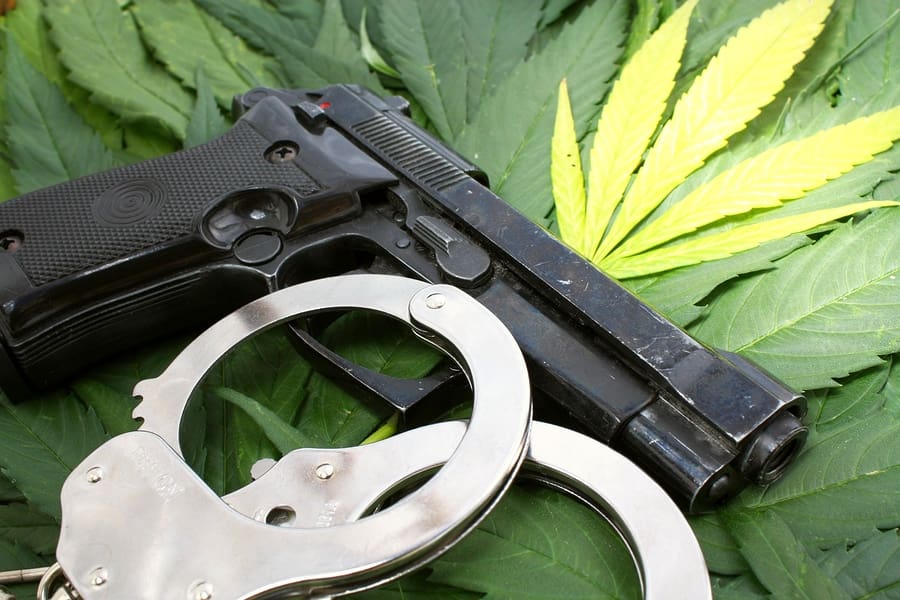
The Ninth Circuit has held that the firearm prohibition on cannabis users is constitutional, even in the context of those with medical marijuana cards, ruling that “these laws will sometimes burden—albeit minimally and only incidentally—the Second Amendment rights of individuals who are reasonably, but erroneously, suspected of being unlawful drug users. However, the Constitution tolerates these modest collateral burdens in various contexts, and does so here as well.”
Thus, in the Ninth Circuit at least, even those with medical marijuana cards are essentially considered acceptable collateral damage to this overbroad government policy.
Buying a Firearm
When anyone buys a firearm from or through a firearms retailer, they’re required to answer questions on the federal “4473” form. In California, there are other state forms that must also be completed, including the Dealer Record of Sale (DROS) form.
The 4473 form specifically asks if the firearm purchaser is an “unlawful user” of marijuana. Even if marijuana use is legal in your state, it’s still illegal under federal law. So to be truthful, you must answer “yes” to this question if you use marijuana.
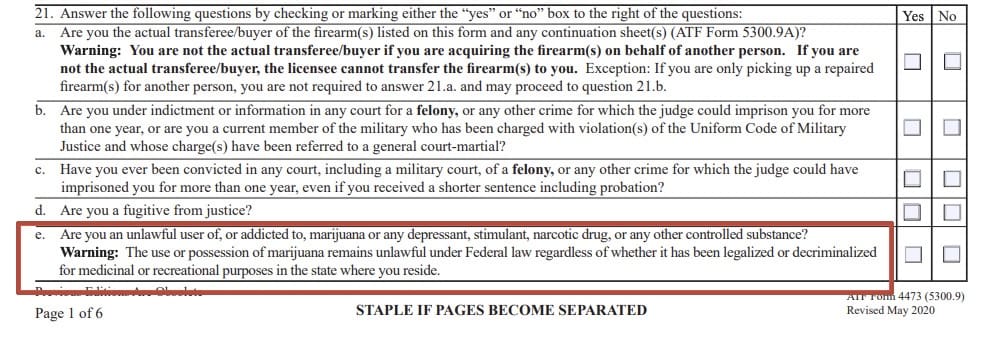
Federal law also expressly prohibits knowingly making any false statement on the 4473. Doing so is punishable by up to ten years in prison and up to a $250,000 fine. So if you don’t answer the questions on the 4473 form truthfully, you can be prosecuted for lying on the form. Prosecutors typically call these cases “Lie and Buy” cases.
Bruen: A Legal Game-Changer
As a recent Associated Press article explained
A landmark U.S. Supreme Court decision on the Second Amendment is upending gun laws across the country, dividing judges and sowing confusion over what firearm restrictions can remain on the books.
The high court’s ruling that set new standards for evaluating gun laws left open many questions, experts say, resulting in an increasing number of conflicting decisions as lower court judges struggle to figure out how to apply it.
The Supreme Court’s so-called Bruen decision changed the test that lower courts had long used for evaluating challenges to firearm restrictions. Judges should no longer consider whether the law serves public interests like enhancing public safety, the justices said.
Under the Supreme Court’s new test, the government that wants to uphold a gun restriction must look back into history to show it is consistent with the country’s “historical tradition of firearm regulation.”
Courts in recent months have declared unconstitutional federal laws designed to keep guns out of the hands of domestic abusers, felony defendants and people who use marijuana. Judges have shot down a federal ban on possessing guns with serial numbers removed and gun restrictions for young adults in Texas and have blocked the enforcement of Delaware’s ban on the possession of homemade “ghost guns.”
In several instances, judges looking at the same laws have come down on opposite sides on whether they are constitutional in the wake of the conservative Supreme Court majority’s ruling. The legal turmoil caused by the first major gun ruling in a decade will likely force the Supreme Court to step in again soon to provide more guidance for judges.
Federal District Judge Rules Ban on Gun Possession by Marijuana Users is Unconstitutional
The case of United States v. Harrison began on May 20, 2022, when Jared Harrison was pulled over for running a red light. A loaded revolver was found in the car, along with a backpack with various marijuana products. A federal grand jury returned an indictment charging Harrison with possessing a firearm with knowledge that he was a marijuana user.
Harrison asked the district court to dismiss the indictment on various grounds, as applied to his marijuana use, violates the Second Amendment. Echoing what the Supreme Court ruled last year in Bruen, Harrison’s lawyers argued that the federal law barring marijuana users from possessing firearms conflicted with the nation’s historical tradition of firearm regulation.
The prosecution argued, on the other hand, that “disarming presumptively risky persons, namely, felons, the mentally ill, and the intoxicated” is in the public interest.
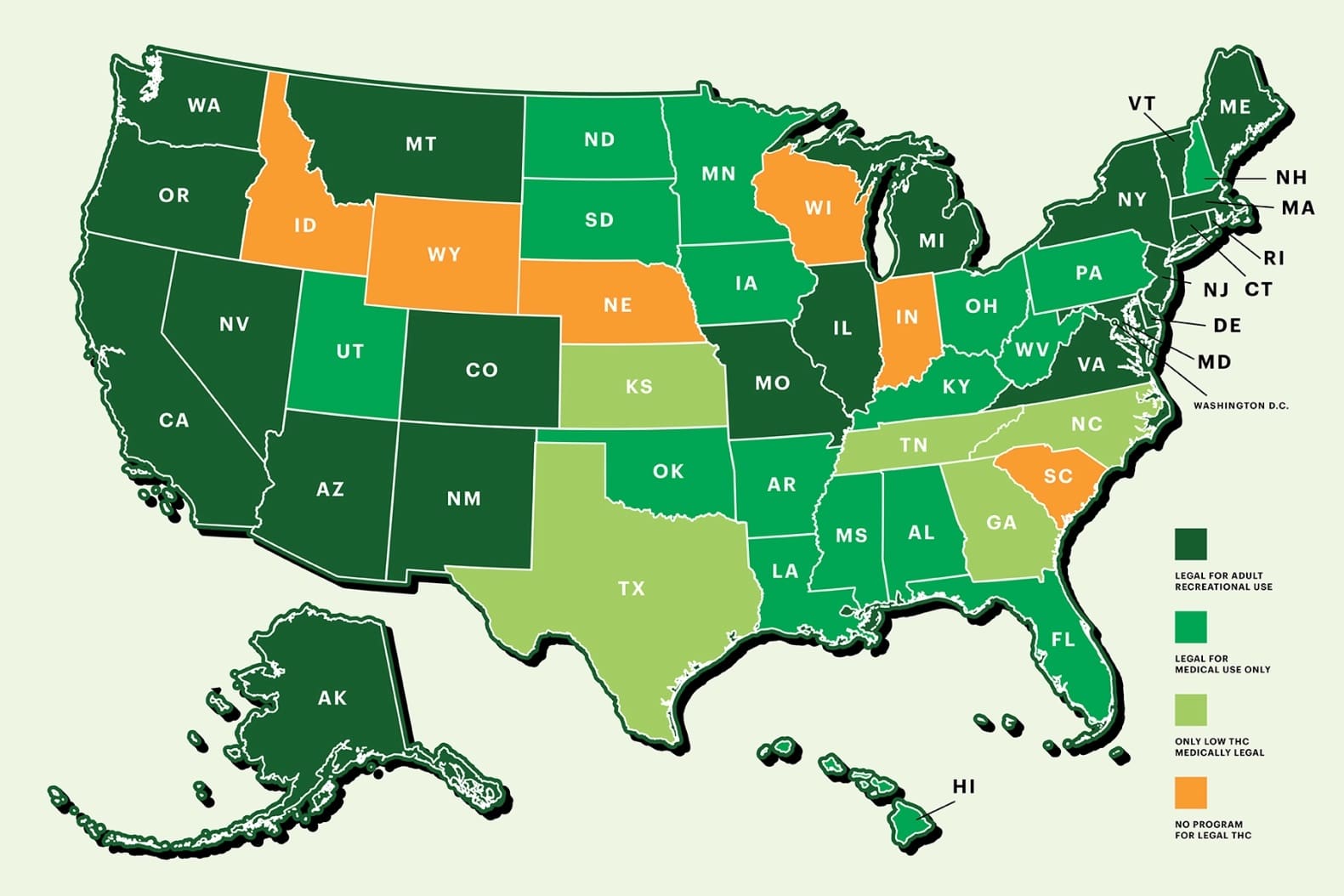
District Court Judge Patrick Wyrick disagreed, holding that the federal law depriving marijuana users of their Second Amendment rights is unconstitutional. He first explained that the federal government cannot simply exclude marijuana users from “the people” who have Second Amendment rights. If it could, he continued, then the power to exclude people from the protections that constitutional rights provide would be essentially limitless . . .
Frankly, it’s not even clear this is carving out a “subset,” as much as an outright declaration of the federal government’s belief that it can deprive practically anyone of their Second Amendment right. Who among us, after all, isn’t a “lawbreaker”? For sure, there may well exist some adult who has never exceeded the speed limit, changed lanes without signaling, or failed to come to a complete stop at a stop sign, but they are few and far between.
The government also argued that § 922(g)(3) was constitutional because it’s analogous to the nation’s deeply rooted historical tradition of disarming felons (because unlawful users of controlled substances have engaged in felonious conduct, even if they haven’t been convicted of it yet).
Again, Judge Wyrick disagreed . . .
Imagine a world where the State of New York, to end-run the adverse judgment it received in Bruen, could make mowing one’s lawn a felony so that it could then strip all its newly deemed “felons” of their right to possess a firearm. The label “felony” is simply “too easy for legislatures and prosecutors to manipulate.”
Judge Wyrick was also amused by the government’s response on this point . . .
Remarkably, when presented with this lawn-mowing hypothetical argument, and asked if such an approach would be consistent with the Second Amendment, the United States said “yes.” So, in the federal government’s view, a state or the federal government could deem anything at all a felony and then strip those convicted of that felony—no matter how innocuous the conduct—of their fundamental right to possess a firearm. Why? Because courts must defer to a legislature’s judgments about what is and is not a felony, says the United States. It’s as if Bruen’s command regarding the inappropriateness of such deference to legislative judgments has been lost in translation.
According to Judge Wyrick, the nation’s historical tradition of regulating firearms supports disarming those who have shown their dangerousness through past violent, forceful, or threatening conduct. But a total prohibition on the right to possess a firearm merely because a person is a user of marijuana doesn’t fall within that tradition.
While the government made other arguments — including a bizarre effort to protect its law by analogizing to racist laws of the past (a move Wyrick called “concerning”) — ultimately it was this logic that led the court to rule as it did.
It bears repeating that all the United States would have to prove at trial in order to justify depriving Harrison of his right to possess a firearm is that he is a user of marijuana. But the mere use of marijuana carries none of the characteristics that the Nation’s history and tradition of firearms regulation supports. The use of marijuana—which can be bought legally (under state law) at more than 2,000 ordinary store fronts in Oklahoma—is not in and of itself a violent, forceful, or threatening act. It is not a “crime of violence.” Nor does it involve “the actual use or threatened use of force.”
That Congress may have passed § 922(g)(3), as the United States suggests, with some vague relation to public safety or “the public interest” does not change this conclusion. It is not appropriate for a court to “reflexively defer to a [legislative] label when a fundamental right is at stake.” And the use of marijuana does not become a violent, forceful, or threatening act merely because the legislature says it is.
Having established that marijuana users who possess firearms come within the plain text of the Second Amendment, Judge Wyrick got to the historical analysis now required under Bruen. He noted that while there is some history of laws regulating firearm possession by intoxicated persons, none appear to have prohibited the possession of a firearm in the home for purposes of self-defense.
Where the seven laws the United States identifies took a scalpel to the right of armed self-defense—narrowly carving out exceptions but leaving most of the right in place—§ 922(g)(3) takes a sledgehammer to the right.
Judge Wyrick referenced the Bruen decision when he stated that marijuana use doesn’t make someone a “dangerous lunatic.”
But the United States’ own conception of the historical tradition demonstrates why §922(g)(3) as applied to Harrison is not analogous to these traditions. Under the United States’ own theory, history and tradition would limit disarmament to dangerous lunatics. And as explained above, the mere use of marijuana does not indicate that someone is in fact dangerous, let alone analogous to a “dangerous lunatic.” There are likely nearly 400,000 Oklahomans who use marijuana under state-law authorization. Lumping all those persons into a category with “dangerous lunatics,” as the United States’ theory requires, is a bridge too far.
Judge Wyrick also noted that the criminal justice system could have kept Harrison behind bars to ensure he didn’t get his hands on a gun if it concluded that he’s a threat.
None of this is to say that the government cannot play a role in protecting the public from dangerous persons possessing firearms. It can, and it should. For example, if the State of Texas thought that Harrison’s alleged involvement in a shooting demonstrated that Harrison was a danger to the public, it could have demonstrated to a Texas judge—in an individualized proceeding of which Harrison would have been given notice and the opportunity to be heard—that Harrison ought to be jailed while awaiting trial for that shooting. The Constitution, after all, permits pre-trial detention, and such detention would be a highly effective means of furthering the government’s interest in protecting the public from a gun-toting Harrison. But that didn’t happen; Harrison was released pending trial in Texas. And so here we are, with the federal government now arguing that Harrison’s mere status as a user of marijuana justifies stripping him of his fundamental right to possess a firearm. For all the reasons given above, this is not a constitutionally permissible means of disarming Harrison.
Judge Wyrick vacated the indictment against Harrison, dismissing it with prejudice. You can read the full ruling here.
In my opinion, the Harrison ruling properly applied the Bruen test. But many state and federal government authorities disagree. Indeed, the federal government appealed the district court decision, so the Tenth Circuit will be deciding on the constitutionality of the marijuana prohibition soon.
You can track this appeal here.
Persuasive Legal Authority vs. Mandatory Legal Authority
The ruling in Harrison was issued by the Western District of Oklahoma. A decision by one federal district court isn’t considered mandatory authority, so other district courts in Oklahoma (or anywhere else) aren’t bound by the decision, and they don’t have to follow it.
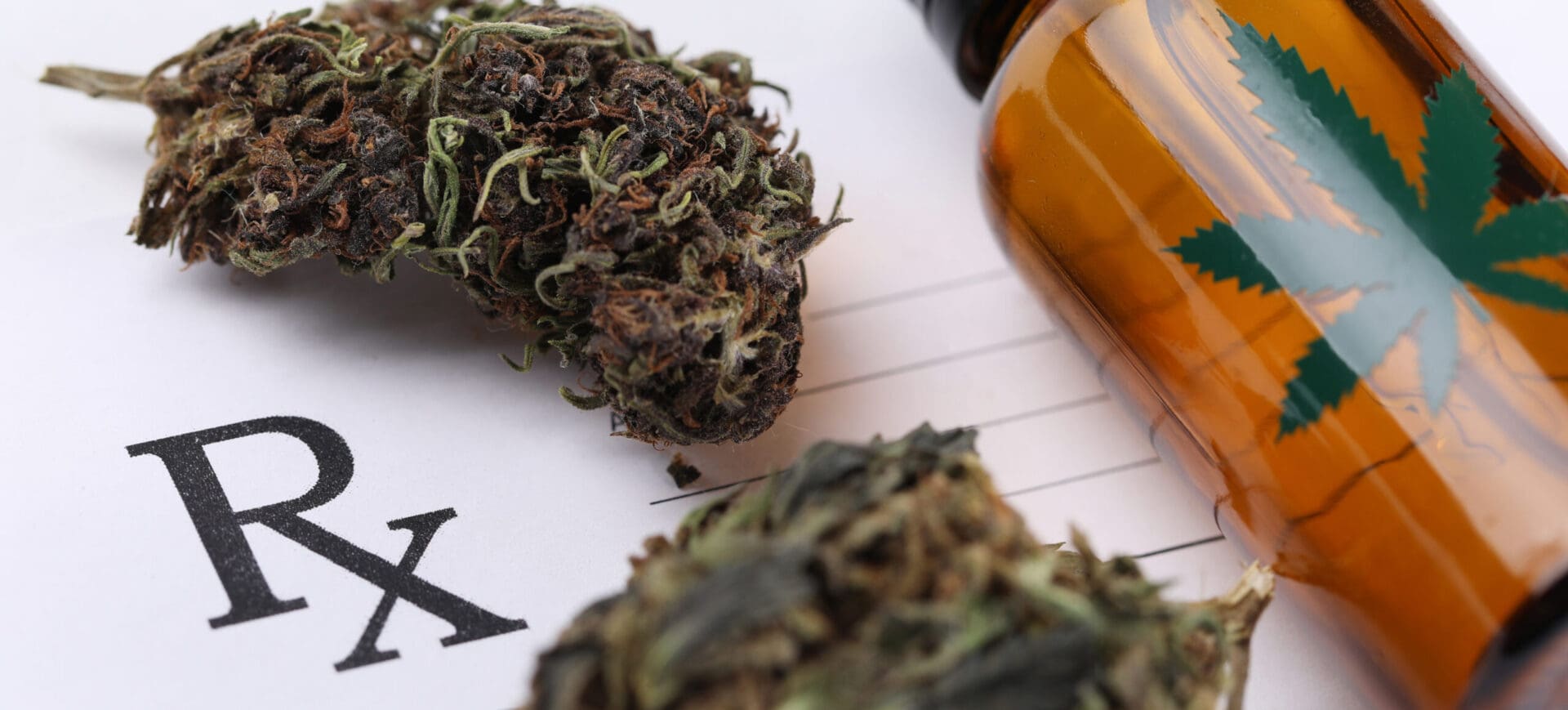
Again, the U.S. government has appealed the Harrison decision. The Tenth Circuit may uphold or overturn the district court’s ruling. If upheld, any ruling (a win or a loss) from the Tenth Circuit would only be binding on federal courts within the Tenth Circuit. But again, such a decision could be relied on as persuasive authority in courts outside that circuit.
Other Courts
So far, two other court rulings have substantively discussed Harrison. The first was not favorable. A district court in the Northern District of Indiana stated in a footnote . . .
The [c]ourt is not persuaded by Harrison in part due to the weight of authority reaching the contrary conclusion, the [c]ourt’s own analysis of the arguments presented in this case, and disagreements with the analysis and conclusions reached by the court in Harrison. For example, the [c]ourt would note that Harrison’s reasoning distinguishing the tradition of disarming dangerous persons from § 922(g)(3) seems reliant on reinterpreting those traditions based on pre-Bruen dissents from circuit decisions. See e.g., Harrison, No. 2:22-cr-328 at *31-*32, 2023 U.S. Dist. LEXIS 18397. The [c]ourt is not persuaded such a dramatic departure from existing precedent is required given Bruen established it was consistent with Heller, and the first step of the pre-Bruen test was also consistent with Heller. Bruen, 142 S.Ct. at 2127-30.
No appeal has been filed in Posey as of this writing.
Things went better in the Western District of Texas, where the court cited Harrison repeatedly to support its conclusion that “Section 922(g)(3) breaks with historical intoxication laws by prohibiting not just firearm use by those who are actively intoxicated but also firearm possession by those who use controlled substances, even somewhat irregularly.”
The federal government has appealed that decision.
It’s likely that similar challenges will be brought in other district courts in other federal circuits, and those decisions will likely also be appealed. Ultimately, perhaps the Supreme Court will have to address the issue, particularly if two courts of appeal reach different conclusions. Indeed, because Harrison and Connelly are proceeding in different circuits, if different conclusions are reached by the respective circuits, the odds of Supreme Court review will increase.
What Comes Next?
For California marijuana users who choose to own a firearm, a similar challenge would have to be brought in a district court in the Ninth Circuit, which includes California. A district court ruling in California would likely be appealed to the Ninth Circuit—the same circuit that ruled in Wilson that federal law prohibits marijuana users from possessing firearms.
But that decision didn’t consider whether the ban itself violates the Second Amendment under Bruen. That is, the Ninth Circuit didn’t consider whether the ban was unconstitutional under our historical tradition of firearm regulation. Instead, it proceeded under the now-defunct tiered-scrutiny approach that gave the government far more deference.

There are legal battles being waged in Second Amendment challenges to various gun control laws across the country right now to determine how to apply Bruen when evaluating the constitutionality of any gun control law. Some of those cases challenge classifications of people who are prohibited by federal law from possessing firearms, like non-violent felons, certain misdemeanants, and people subject to civil restraining orders.
Rulings in those cases might influence a court that’s weighing the constitutionality of bans on firearm possession because of marijuana use.
Avoid Trouble and Know Your Rights
Remember that if you’re using marijuana and possess a firearm, you are breaking federal law.
If you have a medical marijuana card and you own firearms, particularly if they’re registered in your state, that’s evidence that can be used against you. Even if you don’t currently use marijuana, the government may assume otherwise if you have such a card or other evidence of marijuana use.
The Bruen decision specifically addressed concealed carry permits, and what states could require from folks applying for one. The decision has made it much easier in all states, including California, to get a carry permit. But people who apply for a CCW permit are generally asked about drug use, and so forth. If you’re not truthful in your application, you could face years in prison and hundreds of thousands of dollars in fines if the permit’s existence tips the government off that you’re illegally in possession of a firearm.
Further, even while there is no crime specifically barring lying on a CCW permit application, many standard CCW application forms are signed under penalty of perjury. If caught in a lie about marijuana use (or any other information asked on the form), you could be charged with perjury. Even if no such charges are brought, however, getting caught in such a lie would likely mean any future attempt to get a CCW permit will be denied based on prior dishonesty.
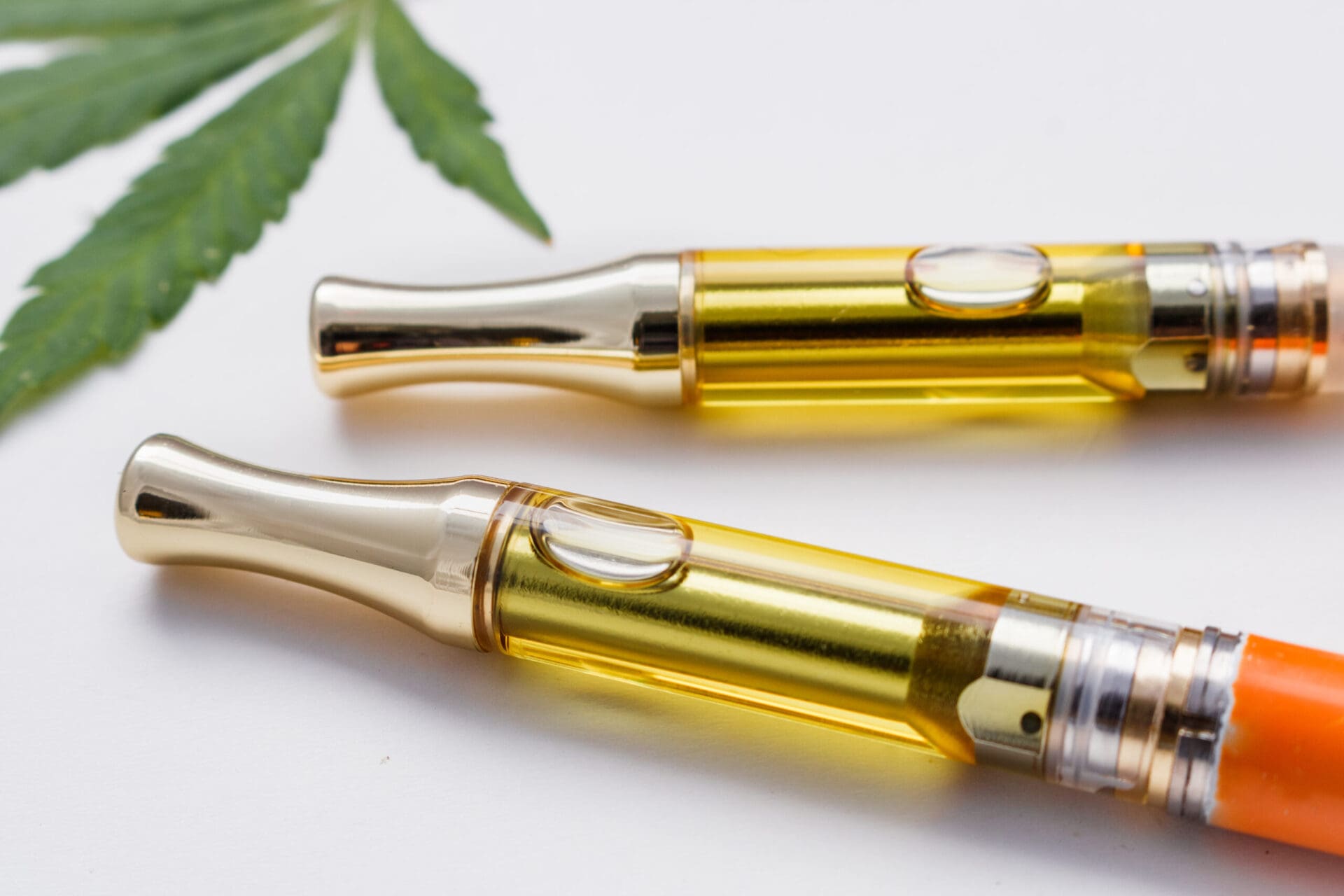
Also keep in mind that you’re vulnerable to being reported by anyone who knows this, and to police if they conduct an investigation for whatever reason. Although prosecuting people for this offense may not currently be high on the list of government priorities, if you possess a firearm and use marijuana, you are at risk. The politics of this issue could change.
Know your rights. Remain silent. Don’t incriminate yourself. Anything you say will be used against you, even if you are not read your rights first. Do not answer questions. Give your name and address only. Repeatedly say, “I want to remain silent and call my lawyer.” Do not discuss your case with police, friends, family, cellmates, or anyone but your lawyer. Beware: Police car and jail phone conversations are recorded and many in jail are informants.
Do not consent to give up your rights. A right voluntarily given up is a right lost. Don’t be tricked, threatened, or persuaded into giving up your rights. Do not “consent” to a search without a warrant. If asked for your consent to a search, politely and repeatedly refuse, and note any nearby witnesses. Do not sign any statements without an attorney’s advice.
Ask for a lawyer. If you’re arrested, you may be handcuffed, searched, photographed, and fingerprinted. Do not physically resist a search or arrest. You have a right to have an attorney present during any questioning. Once you say you want to remain silent and ask for a lawyer, questioning should stop. If they keep asking questions, keep silent and keep asking for your lawyer. Call and get your lawyer involved ASAP.
C.D. “Chuck” Michel is Senior Partner at the Long Beach, California Law firm of Michel & Associates, P.C. He is the author of California Gun Laws, A Guide to State and Federal Firearm Regulations now in its 10th edition for 2023 and available at www.calgunlawsbook.com.


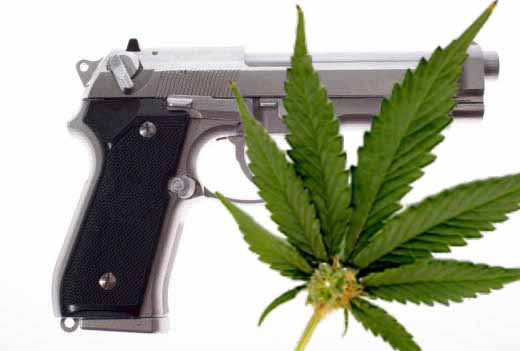

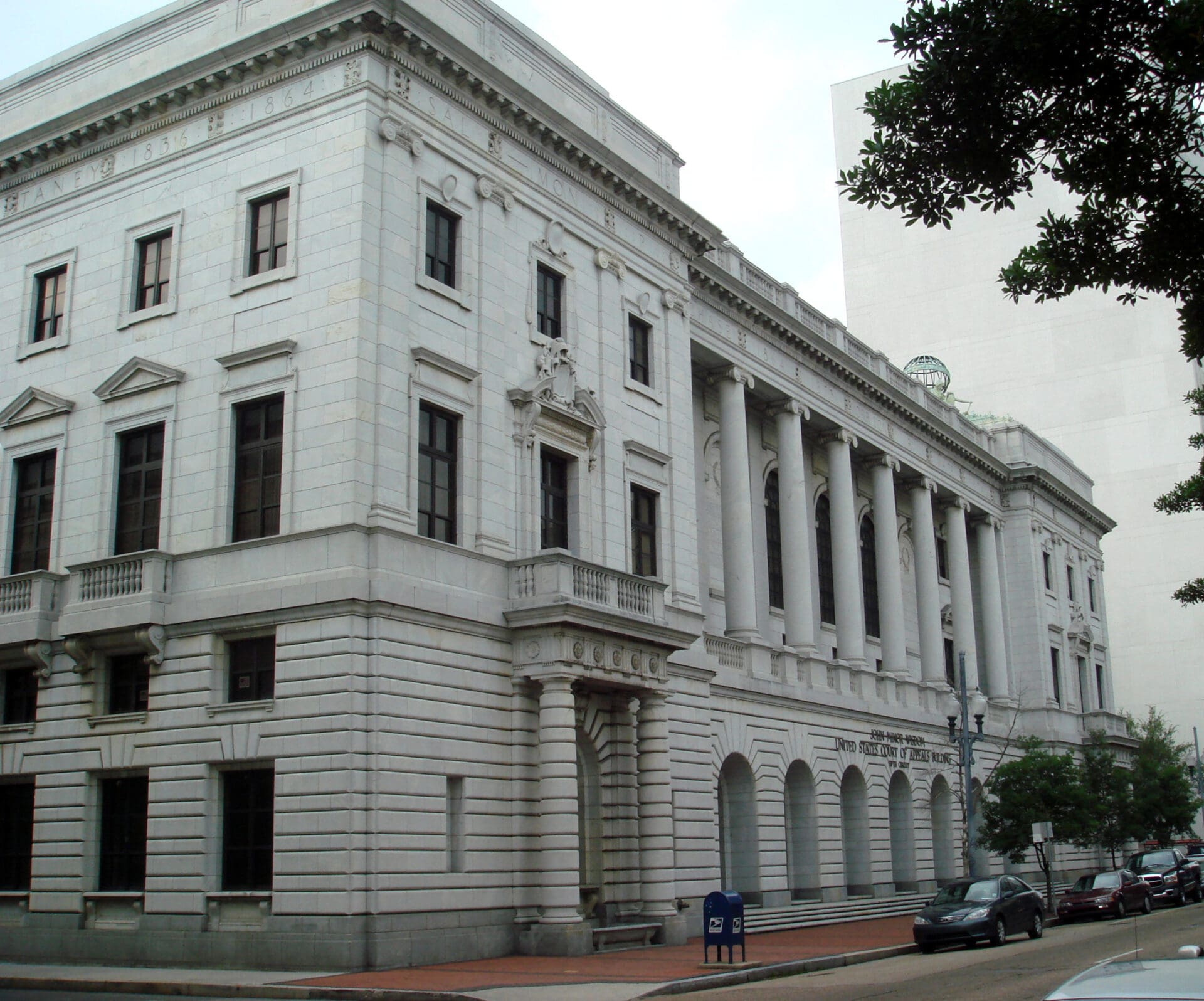
It was always a trade. Your gun rights for “the security of not being arrested for smoking and possessing marijuana in public and private”. I grew up in California. The drug leg@liz@tion crowd has always been anti-second amendment. Anti-civil rights. If you can find a gun store who will sell you guns, while you are smelling of the stench of marijuana??? I would be very surprised.
I don’t know of any gun store who will sell you a gun, with the smell of alcohol on your breath. And the gun stores I patronize have signs posted, stating that if you smell like marijuana to just leave their property. They will not sell you anything.
Only the drug leg@liz@tion crowd believes you can pilot a passenger airplane, work on someone’s automobile brakes, and perform brain surgery all while under the influence of marijuana.
The “gun Community” likes talking about responsibility. Until the subject of gun ownership and marijuana comes up. Then all the safety considerations seem to go out the window.
All the normal people believe that alcohol and guns are a terrible mixture.
The law abiding potheads have a right to the second amendment. But that does not make them responsible gun owners. As far as I’m concerned they’re going to have to prove that.
The drug legalization crowd wants you compliant, pot helps.
Yep.
Are you looking for a job of your choice??? Can’t find the job you want even after visiting different websites? Considering your needs, we have organized our website with all categories of jobs, visit this link now….. https://dailypay7.blogspot.com/
SOOO GLAD GOT AWAY FROM TOBACCO , ALCOHOL , NEVER WAS MUCH FOR DRUGS .
ALL OF IT WAS WASTE OF MY TIME , MONEY AND HURT MY HEALTH .
NOT PAY THEM COMPANIES FOR RUINING MY HEALTH ANY MORE .
HALLELUJAH …
And people really give a rats ass about what you want.
Interesting analysis. I will be *very* curious to see how the Tenth and Fifth Circuits deal with these cases. Given the Fifth Circuit’s decision in Rahimi (which tossed the prohibition of firearms by those subject to domestic relations protective orders), I suspect the WDTx decision in Connelly will be affirmed.
BTW, the link to Connelly (the WDTx case described) actually links to a Second Circuit decision. The WDTx Connelly decision is worth reading. (Dan, I’m e-mailing you a copy of the decision.)
Dan’s now fixed the link so that it points to the Connelly decision. Its worth taking the time to read.
Thanks for pointing that out. We try to vet all of our articles bt occassionally an error slips through.
NP. The Second Circuit was “Connolly v. United States,” so the error is understandable. (We all make citation errors like that. I’m fortunate to have a great paralegal who is quite adept at catching mine.)
LKB, I looked up that case and it was US v Connolly https://law.justia.com/cases/federal/appellate-courts/ca2/19-3806/19-3806-2022-01-27.html
Potheads can rationalize anything. Dang Chatty also (take a breath OP pothead).
Cops in CA regularly sat outside medical weed dispensaries and checked plates to see if you had firearms registered in your name.
Freedom is messy. All you guys that believes the .gov has a right to tell you what you can or cannot put into your bodies are no different than the anti gunners.
Either we have freedom or we do not.
If a business owner can refuse to sell his goods to anyone? Then we will have the messy freedom you are talking about.
“If a business owner can refuse to sell his goods to anyone?”
I kinda hate to point this out, but if a business refuses to sell to anyone, they don’t have a viable business, unless they have they have the kind of money to burn just sitting there.
(I actually know a guy who does exactly that. He inherited a serious pile of money, and his hobby was comic books, so he didn’t care at all if the store made a single dollar. Must be nice…)
Freedom is messy isn’t it?
put down the pipe or lose your right.
damn drug addicts…
😅
“So, in the federal government’s view, a state or the federal government could deem anything at all a felony and then strip those convicted of that felony—no matter how innocuous the conduct—of their fundamental right to possess a firearm.”
I’ve made that EXACT argument a number of times here in TTAG in the past that if we ever score big-time on gun rights (and ‘Bruin’ *fully* qualifies 🙂 ), the Leftist Scum will respond by making as many things as they possibly can to be a felony crimes, to keep as many of us as they can, unable to lawfully own guns.
Just two examples I gave – Get into a heated argument at work? Someone who can’t control their temper shouldn’t be allowed to own a gun.
Ticketed for speeding or reckless driving? Someone who can’t responsibly control 2 tons of steel hurtling 60 MPH down a road can’t be trusted with a gun.
To the Leftist Scum ™ that hate us and our guns, that would seem a perfectly reasonable law.
The more it sinks into them just how devastating the ‘Bruen’ decision will be to their fascist plans for full control, the more irrational they will get. Be ready… 🙁
Let’s say that someone is on antidepressants. That’s a Schedule IV controlled substance.
Testosterone supplemental injections are a Schedule III.
Either “user” doesn’t qualify to purchase a firearm?
Does “addicted to” include “habitual user” or “dependent on?”
Marijuana and alcohol abusers made the mistake of choosing a substance that makes it easy to identify them as users.
They smell bad.
People who abuse pills generally do not give off offensive odors. So the pill poppers can get away with it longer and not be detected.
“Being on” a Schedule II-V with a prescription from a licensed medical practitioner who has a DEA# to prescribe Schedule II-V negates the prohibition because it is assumed that the medical practitioner has evaluated the patient that they are not an “abuser”.
Marijuana is considered Schedule I.
There would remain an exception for the two remaining members of the Compassionate Investigational New Drug program, established in 1978,
https://nida.nih.gov/publications/drugfacts/cannabis-marijuana
https://www.ncbi.nlm.nih.gov/books/NBK224396/
Sorry, folks, but marijuana is a dangerous drug.
Updated info 5/26/2023
https://www.firearmspolicy.org/fifth-circuit-clarifies-that-its-injunction-against-atf-pistol-brace-rule-covers-fpc-s-members
NEW ORLEANS, LA (May 26, 2023) — Today, Firearms Policy Coalition (FPC) released a statement on the Fifth Circuit’s Order clarifying that the Injunction Pending Appeal in Mock v. Garland applies to FPC’s members, Maxim Defense’s customers, and the individual plaintiffs’ resident family members. The order, along with other case documents, can be viewed at FPCLaw.org.
…
“We’re incredibly excited to report that the Fifth Circuit has clarified that our injunction covers FPC’s members and Maxim Defense’s customers, as we have always argued for,” said Cody J. Wisniewski, Senior Attorney for Constitutional Litigation. “This relief will offer protection while we continue to fight against ATF’s overreach.”
Wow!
“This relief will offer protection while we continue to fight against ATF’s overreach.”
This relief will offer protection if you are an FPC member or a Maxim Defense customer or the individual plaintiffs’ resident family members.
The rest of you law abiding folks will soon be unjustly and unconstitutionally declared ‘felons’ and might start receiving a visit from the ATF AND some of those new 40’ish thousand IRS G̶e̶s̶t̶a̶p̶o̶ ‘agents’ who will have ‘unconstitutional’ jurisdiction because you did not pay the unconstitutional $200.00 tax to have a ‘SBR’ that was unconstitutionally declared an ‘SBR’ because the ATF unconstitutionally and illegally circumvented congress upon order from their boss Biden and for which the Everytown gun control group lobbied and in ‘secret’ meetings with the ATF basically wrote the unconstitutional ‘law by rule making’.
Yes, the IRS now has a fresh new army of heavily armed G̶e̶s̶t̶a̶p̶o̶ ‘agents’ coming on line to persecute and threaten and endanger you and your loved ones under tax code because of that unconstitutional $200.00 tax thing which is actually a treasury department thing under which the IRS exists.
Did you seriously think Biden wanted those new armed IRS G̶e̶s̶t̶a̶p̶o̶ ‘agents’ to round up someone who cheated a little on taxes?
The intervention of the IRS is so Biden can go after guns and confiscate under tax code, because he plans to include all guns under the NFA which subjects them to the $200.00 tax. While you folks are concentrating on the “its just the brace’, its more than that. The brace thing is just a test, if the ATF can win the brace rule thing it allows them unfettered ability to make all firearms subject to the NFA with some words in a ‘rule’ and confiscate guns unless you paid the $200.00 tax which means a lot of guns confiscated because not many are going to pay the $200.00 tax on guns they already own (only a fool would subject them self to that tyranny move) – and in addition a lot less guns will be sold because of the additional $200.00 tax.
The founders gave us the Second Amendment to resist such tyranny when other means fail. Those other means include civil disobedience, and although there are a lot of examples of those and one being in some events leading up the Revolution, another famous and well known example is from Martin Luther King Jr. who in a letter from a Birmingham Jail wrote “One has not only a legal but a moral responsibility to obey just laws. Conversely, one has a moral responsibility to disobey unjust laws.”
(note: someone is going to reply with a quote supposedly from Thomas Jefferson, that being “If a law is unjust, a man is not only right to disobey it, he is obligated to do so.” – actually, this is misattributed, there is actually no evidence Jefferson actually said/wrote that. The phrase has been so frequently misattributed to Jefferson that it was included in the Thomas Jefferson Foundation’s list of ‘spurious quotations’ but the foundation found there was no actual proof that Jefferson actually said/wrote that. So in reality, although it encapsulates the concept and desire and action and sentiment and just-cause and constitutionally-permitted-resistance-action echoed in the U.S. Constitution and that by Martin Luther King Jr. and by the founders and throughout our history as a country and the sentiment of Jefferson himself in other writings – Thomas Jefferson never really said/wrote that in that form.)
Will NOT Comply
Just to clarify will not comply with paying a tax on legal items I already own. besides I don’t have a spare $40G laying around
We often have a few drinks after a gathering and after we spent a little time out shooting. A drink or 3 around a bonfire in the evening is a plesant way to socialize with friends and family.
Myself, I tried pot a couple times as a very young man. Didn’t like it so have not bothered with it since. Alcohol use and use of other mood/mind altering substances needs to be restricted to after the guns are put away. Same with driving, operating potentially dangerous equipment, and most other tasks. I don’t want a bus driver toking up or taking a swig before getting behind the wheel. Or the chef in the kitchen taking a hit of coke before cooking my dinner.
What they do after work, or after the guns are locked up is their choice.
Most state have a zero tolerance for alcohol with concealed carry. Should be the same for any other substances not proscribed, with limits on even proscriptions that may affect mood etc. Carry, not ownership or right to buy.
“Only the drug leg@liz@tion crowd believes you can pilot a passenger airplane, work on someone’s automobile brakes, and perform brain surgery all while under the influence of marijuana.”
fyi
From 2018
“Bus driver fired after video appears to show him lighting crack pipe”
https://www.kxan.com/news/local/austin/bus-driver-fired-after-video-appears-to-show-him-lighting-crack-pipe/
Since I lost one of my lungs I’ve cut my smoking in half.
CSA is unconstitutional. Free Filburn!
2 dogs and 2 suspects shot when Florida home invasion turns deadly. The incident involved four suspects aged between 17 and 32. One of the suspects was confirmed dead on-site, while another remains in a critical condition. Unfortunately 2 dogs were also shot in the fire fight, one dog lived the other died.
https://www.wfla.com/news/crime/2-dogs-shot-when-florida-home-invasion-turns-deadly/
Great example of what passes for “journalism” today.
Who? What? Where? When? Why? The story answers only two out of five.
Who did the shooting? What happened besides two dogs and two suspects being shot? Why did this happen? Where is the follow-up story? When can we expect to find out more?
This story would have earned me an “incomplete” from my journalism professor.
Yes. its what passes for journalism in MSM today.
The only reason it made the news is because of the dogs and is ‘sensational’, to imply ‘collateral damage’ from the ‘alleged victim’ (implied by their use of ‘home invasion’) acting in defense with a firearm when its the bad guys (suspects) who shot the dogs so notice how it doesn’t say that. In the mean while, on the same day, across Florida there were 237 other home invasions in which the confirmed law abiding victims used a firearm for defense and not a peep from the media because they were not ‘sensational’ enough and no ‘collateral damage’ but they reside in police reports.
Ahhhh Depot Town (top photo)
File this one under the subject, “doing drugs in public and it’s consequences.”
“A Seattle bus driver is on medical leave after he claims passengers commonly smoking fentanyl on his bus have made him sick.”
“Stevon Williams, a driver for King County Metro, was placed on leave while awaiting test results of overexposure to smoke from the lethal synthetic opioid, though health officials say the second-hand smoke “poses no real risk,” according to a local report.”
https://nypost.com/2023/03/07/seattle-bus-driver-says-passengers-smoking-fentanyl-on-has-made-him-sick/
So the second hand smoke issue from marijuana or fentanyl is no big deal. But the second hand smoke from the drug called tobacco is a big deal???
Its the liberal ‘narrative control’ ideal again. If they were to say there was a second hand smoke issue from marijuana (or fentanyl), it would undermine the claims there is no harm from smoking marijuana thus undermine one of the biggest claims that supports its legalization which is there is no harm from it. Can’t have the public thinking there could be some harm from it after all, control the narrative.
“We have reason to believe that the vast majority of the fentanyl when smoked, is captured within the person smoking it,” Warren said.
Public Health – Seattle & King County published a Q&A with the Washington Poison Center, which echoed the same information, saying most of the drug is filtered out by the user before there is second-hand smoke. — https://www.king5.com/article/news/health/dangerous-second-hand-fentanyl-exposure-healthlink/281-3d8241ab-2309-42a4-b899-7570d78d298f
They said that for cigarettes too.
29 miles north of Seattle, in Everett, a 1 year old girl passed away from fentanyl exposure earlier this month. Her mother was smoking fentanyl in the baby’s presence.
Did the baby die from second-hand smoke or from “exposure” to fentanyl?
EVERETT — Sheriff’s detectives believe a 1-year-old girl “ingested” her mother’s fentanyl in an Everett hotel room, leading to the child’s death earlier this month, according to a new search warrant.
The mother, 37, reported she regularly smoked fentanyl in the same bed as her infant while living in a room at the Sunrise Inn at 8421 Evergreen Way, investigators said. She told deputies she kept the drug in her purse, in what a detective described as “an easy to open rubber container.” — https://www.msn.com/en-us/news/crime/police-mom-accused-of-infant-s-fentanyl-death-kept-drug-in-purse/ar-AA1bku2q
I doubt the 1-year-old opened the container. Druggie mom left it out.
That map of the United States from Rolling Stone kind of portrays America’s slow roll into a once great nation. You may be free to smoke weed as a right but I don’t want your dumb ass sitting behind me at an intersection. Ask me how I know.
Really, you’re all making a big deal out of nothing. If caught , just invoke the “Hunter Biden Clause”
… ” I don’t recall doing any of that shit you’re accusing me of doing, even if there is video evidence of me doing it.”
Allegedly.
“That’s Russian disinformation.” Look at this long list of intelligence officers backing me up.
Thanks for everyone’s comments. If you want to suggest other topics we should cover, send an email to [email protected]
A drug is a drug is a drug. If you use marijuana, you are a drug abuser.
COOL STORY, Walter!! Now do alcohol. And prescription anti-depressants.
I’ve said before – I like a good Scotch in the evening. Before I open the bottle, I put my gun away. My son does the same in his house, but he REQUIRES all his guests to disarm before he will serve them.
We start playing “pick and choose” and all we are doing is documenting our hypocrisy. Alcohol is a drug. So is THC/marijuana. If one isn’t “disqualifying”, the other shouldn’t be, either. The responsibility is on for safe gun ownership/use is on the owner/user (as it should be) in both cases.
LAmp, I think so. Yep, alcohol is a kind of drug, but in fact is is LEGAL. If you like drinking around firearms, I would not go near you with a 10 foot pole. Marijuana has been ILLEGAL for quite a while and its ill effects are far worse than alcohol. For your edification: https://nida.nih.gov/publications/drugfacts/cannabis-marijuana
https://www.samhsa.gov/marijuana
https://www.mayoclinic.org/drugs-supplements-marijuana/art-20364974
I knew you would object to what the government says, so I provided the Mayo clinic as well.
Wouldn’t be such a big deal if marijuana induced schizophrenia wasn’t a thing.
As I said previously I grew up in California. My parents both of them were employed in the drug rehabilitation business. And it is a business. And back then in 70s that business was in its infancy. And now drug rehab has become “big business”. The marijuana of the 1970s is not the marijuana of the 21st Century.
“Reefer Madness” was real. Because there was a small number of people who were especially susceptible to it’s negative effects back then. Unfortunately now that the potency of THC in marijuana has been increased by the thousands. Now large sections of the population are negatively affected by its constant use.
The drug leg@liz@tion crowd are liars. They are all s0ci@list Pr0gressive in their political 0rient@tion. They want the government to subsidize drug abuse. And these Liars don’t live in the neighborhoods that are the most negatively affected, by their support for leg@liz!ng drugs. And at the same time they are defunding the police. And making it legal to steal private property, as long as it’s under $950.
Guns and pot don’t mix. No change my mind.
“The Dark Side of California’s Legalization of Marijuana | Heidi Swan”
video 36 min long
https://www.youtube.com/watch?v=XAaxRn1rEOc&t=4s
The 1930s “Reefer Madness” was real. Because there was a small number of people who were especially susceptible to it’s negative effects back then. Unfortunately now that the potency of THC in marijuana has been increased by the thousands. Now large sections of the population are negatively affected by its constant use.
The drug leg@liz@tion crowd are liars. They are all s0ci@list Pr0gressive in their political 0rient@tion. They want the government to subsidize drug abuse. And these Liars don’t live in the neighborhoods that are the most negatively affected, by their support for leg@liz!ng drugs.
And at the same time they are defunding the police. And making it legal to steal private property, as long as it’s under $950.
As long as Property Owners can shoot thieves dead on site or, dead on sight, I have no problem you legalize and drugs. I would prefer that drug users be denied welfare benefits. But the leg@liz@tion crowd doesn’t support that reform.
Whiskey has been used as an effective medicine for hundreds of years. I actually research this for a college paper I wrote. Unfortunately it gets abused by the freaks just like many other effective medications.
A drunk and their guns do not mix well together.
Wow, have you ever met a chronic marijuana user? These people are seriously mentally deranged. They do not make good life choices and you want this to legal. Darwin at it’s finest.
Over the last 30 years, psychiatrists and epidemiologists have turned speculation about marijuana’s dangers into science. Yet over the same period, a shrewd and expensive lobbying campaign has pushed public attitudes about marijuana the other way. And the effects are now becoming apparent.
Almost everything you think you know about the health effects of cannabis, almost everything advocates and the media have told you for a generation, is wrong.
https://imprimis.hillsdale.edu/marijuana-mental-illness-violence/
freedom own gun freedom smoke herb
can not do both
🇺🇸🥰
The H.R.5485 – Hemp Farming Act of 2018 federally legalized hemp products containing less than 0.3% delta9 thc by weight. In passing this law congress inadvertently legalized a slew of delta9 thc analogs that are intoxicating, delta8 thc being the most prevalent. Would a user of these hemp derived products be clear under federal law to own a firearm?
Comments are closed.